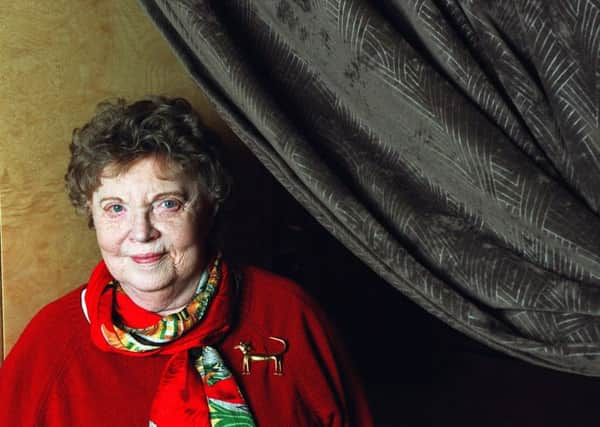Chapter One of Territorial Rights by Muriel Spark, with an introduction by Kapka Kassabova


Territorial Rights - Chapter One
The bureau clerk was telephoning to the Pensione Sofia while Robert Leaver watched the water-traffic at the ferry and the off-season visitors arriving in Venice. It was a sunny day in October. The clerk, having spoken to the Sofia, told him there was a room vacant there. Robert nodded. ‘On vacation?’ said the bureau man. ‘Research. Art History,’ said Robert, lifting his briefcase and his suitcase.
He was taken to the Pensione Sofia through the sunny waters of palaces, domes and ferries. It was his first visit to Venice and he was young; but he had only half a mind to feel enchanted, the other half being still occupied with a personal anxiety in Paris from where he had just come. So that, while he was subject to the imperative claims of Venice the beautiful on first sight, he heard still in his ears the impatient voice of the older man: Goodbye, goodbye, good- bye, goodbye. Robert had been floundering about his own goodbyes, had made them apologetically, had said too many goodbyes. His suitcase in his hand, Robert had turned on the doorstep. ‘I’ll get in touch . . . goodbye again . . . good- bye for now . . . well, good –’
‘Goodbye, goodbye, goodbye, goodbye.’
Advertisement
Hide AdIt was as if the older man had said, ‘You bore me. You can’t even leave in good style. You haven’t any slightest savvy about partings. You’ve always bored me. Goodbye very much. Goodbye.’
With this angry memory not far behind, Robert let himself take in Venice, noting everything he passed on the way to the Pensione with a merely photographic attention.
The bright-eyed, plump young porter was waiting for him at the gate ready to take his bags. Robert let go of his suitcase but clung nervously to his briefcase. The porter showed no involvement one way or the other, but proceeded up the short flagged path of the street-entrance to its high glass doorway. The outside walls of the Pensione were flaky but obviously it had been a handsome villa. He followed the porter into a long reception hall. The villa had been converted into a little private hotel. A few people were sitting about, ready to go out, waiting for their friends to come down. There was a large dark television set at the far end of the room with a group of chairs round it emptily waiting for the evening to fall. Behind the television was a wide french window, its curtains open; beyond that a long garden receding from the back of the house.
Two middle-aged women simultaneously detached them- selves from the armchairs. One had been knitting, the other reading a magazine. They might have been guests, but they approached the reception desk together, smiling, obliging, and in charge. Their heads, as they bent over the big book to check his room, were alike, yellow-grey, neatly and newly done by the hairdresser. The forefinger of one of the women moved down the page to find his place, the forefinger of the other found it.
One of the good ladies behind the desk was asking, in adequate hotel English, how long he wanted to stay.
He opened his mouth and paused before replying in a French-inclined Italian, ‘Two or three weeks. Maybe a month’; and he seemed to have made this decision on the spot; almost, he could have said ‘Two or three days. Maybe a week.’
Advertisement
Hide AdHer fingers moved around in the big book. ‘There’s a large room with two windows and separate shower, or another room, smaller with full bath.’
‘Two windows?’ the young man said. ‘The room with the bath, has it two windows?’
Advertisement
Hide Ad‘No, only one,’ Eufemia said. ‘I’ll show you both rooms.’ She reached for the keys.
He followed, inordinately fussed about the choice between the two assets. A room with two windows, and only with shower. A room with one window but a full bath. Goodbye, goodbye. He took the large room with two windows and shower.
‘Thank you, signora,’ he said, whereupon she invited him to call her Eufemia, adding that her sister was Katerina. And even this made Robert anxious, lest he should have got himself into an over-intimate guest-house, which might threaten his privacy.
‘You’re lucky to find this room,’ Eufemia said as she checked the soap and the towels, and opened the cupboards and drawers to see that all was well for the new visitor. The room was large and randomly furnished with slightly shaky, though shiny, furniture. He noticed a telephone by the bed, and a desk, which for some reason reassured him about his personal independence in the place. ‘Even out of season,’ Eufemia was saying, ‘you’d be surprised how many tourists arrive every day in Venice. Are you on holiday?’
‘Research,’ he said. ‘Art History.’
One of the windows looked out on a garden with the canal beyond, the other had a view of a large square with a bulbous church at the end of it.
‘Art history? Good, good!’ said Eufemia, as if unique wonders would never cease. ‘Well, sir, can I have your passport for the register?’
Territorial Rights by Muriel Spark, Polygon, 224pp, £9.99